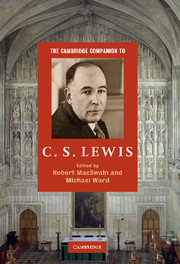7 - On theology
from Part II - Thinker
Published online by Cambridge University Press: 28 November 2010
Summary
“At the beginning I said there were Personalities in God. Well, I'll go further now. There are no real personalities anywhere else. Until you have given up your self to Him you will not have a real self.” / So writes C.S. Lewis towards the end of his book of broadcast talks, Beyond Personality, which later became the last part of Mere Christianity. He regarded this small book as his attempt at communicating (or as he later puts it, 'translating') Christian theology for the non-theologian, and even more for the non-Christian. This is his sustained effort at Christian doctrine. Elsewhere in Mere Christianity he assumes the role of apologist, evangelist and Christian ethicist, but here he puts on the mask of the theologian, though with some hesitancy, and it is in this role that I want to assess him in this chapter. / The heart of the matter - The making of persons / In the short passage I have quoted above, Lewis brings together the doctrines of God, human nature and salvation in a concise way. I hope to show both how they hit the very centre of Christian belief, and yet how they also, ironically, raise some disturbing questions about Lewis's approach.
- Type
- Chapter
- Information
- The Cambridge Companion to C. S. Lewis , pp. 89 - 104Publisher: Cambridge University PressPrint publication year: 2010
- 2
- Cited by



